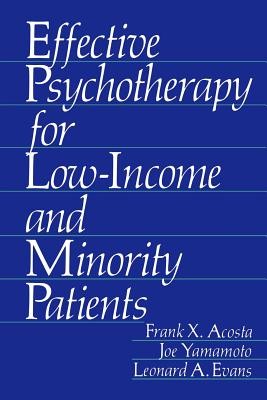
- We will send in 10–14 business days.
- Author: Frank X Acosta
- Publisher: Springer
- ISBN-10: 0306408791
- ISBN-13: 9780306408793
- Format: 16.1 x 23.4 x 1.1 cm, softcover
- Language: English
- SAVE -10% with code: EXTRA
Effective Psychotherapy for Low-Income and Minority Patients (e-book) (used book) | bookbook.eu
Reviews
Description
Psychotherapy involves a deep ethical commitment to self-knowl- edge, personal change, and mutual respect by both the therapist and the patient. Unfortunately, therapists have not always lived up to that commitment in understanding and treating low income and minority patients. Too often they lack the skills to understand and adjust to the patient's community and cultural experiences. The result has been ineffective and misguided treatment. Effective Psychotherapy for Low-Income and Minority Patients is a handbook for psychotherapists interested and committed to correct- ing this situation and pursuing effective treatment strategies. This book is based on the author's ongoing innovative research project at the University of Southern California School of Medicine's Adult Psy- chiatric Outpatient Clinic. Located in East Los Angeles, the clinic serves this nation's largest Hispanic American community and has service commitments to residents of the central Los Angeles region. Over the years the authors have noted not only a marked need to improve mental health services, but also a need to make them more accessible to minority and low income patients. Generally these pa- tients have very negative ideas about treatment of emotional prob- lems. They typically react to treatment with skepticism: no one has really listened to them or understood them before-why should this therapist do so now? In describing this pessimism the authors discuss the need to listen to and respect each other.
EXTRA 10 % discount with code: EXTRA
The promotion ends in 20d.20:43:55
The discount code is valid when purchasing from 10 €. Discounts do not stack.
- Author: Frank X Acosta
- Publisher: Springer
- ISBN-10: 0306408791
- ISBN-13: 9780306408793
- Format: 16.1 x 23.4 x 1.1 cm, softcover
- Language: English English
Psychotherapy involves a deep ethical commitment to self-knowl- edge, personal change, and mutual respect by both the therapist and the patient. Unfortunately, therapists have not always lived up to that commitment in understanding and treating low income and minority patients. Too often they lack the skills to understand and adjust to the patient's community and cultural experiences. The result has been ineffective and misguided treatment. Effective Psychotherapy for Low-Income and Minority Patients is a handbook for psychotherapists interested and committed to correct- ing this situation and pursuing effective treatment strategies. This book is based on the author's ongoing innovative research project at the University of Southern California School of Medicine's Adult Psy- chiatric Outpatient Clinic. Located in East Los Angeles, the clinic serves this nation's largest Hispanic American community and has service commitments to residents of the central Los Angeles region. Over the years the authors have noted not only a marked need to improve mental health services, but also a need to make them more accessible to minority and low income patients. Generally these pa- tients have very negative ideas about treatment of emotional prob- lems. They typically react to treatment with skepticism: no one has really listened to them or understood them before-why should this therapist do so now? In describing this pessimism the authors discuss the need to listen to and respect each other.


Reviews